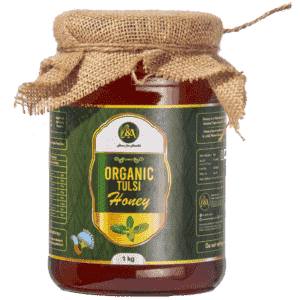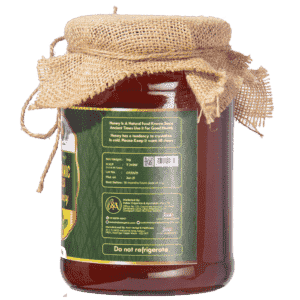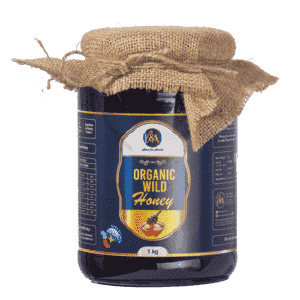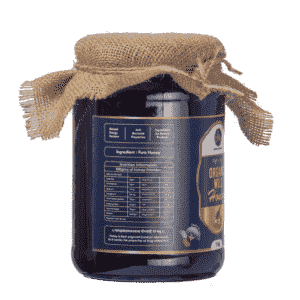While choosing honey you are likely to come across brands that use words like “raw,” “pure,” “organic,” or “unfiltered” – but what exactly is the difference between them? In many cases honey can be more than just one of these things. However, they all have different meanings and knowing which type of honey refers to what, helps you choose the healthiest honey.
To make it easier to understand the different kinds of honey, we are explaining the definitions for each kind of honey in the simplest way:
1. Pure Honey : If a brand labels their honey as “pure honey”, it means they are selling 100% honey. Their product does not include any added ingredients like corn syrup which is sometimes added by industries to increase profits. However, “pure honey” alone doesn’t always tell you much about the varietal of the honey or how the honey is produced. So it’s good to look for more information to make sure you’re getting all the benefits you can from honey when it’s produced in the most bee- and environment-friendly way.
2. Raw Honey : The key difference between Pure Honey and Raw Honey is that, raw honey is not heated up to the point of pasteurization. The benefit of not heating up the honey is that the naturally occurring mineral, vitamins and enzymes remain untouched. However, if you have pollen allergy, you might want to stay away from the raw form of honey.
3. Unfiltered Honey : “Filtering” the honey basically means processing the honey to remove the minute particles, often even as small as the pollen. But do not mistake filtration for straining. Straining is commonly done to remove bee parts and other large debris, before packaging while still retaining the pollen and other beneficial qualities of honey. With filtration, honey is also often heated to liquify it in order to make the filtering process easier, meaning that the honey is no longer Raw. Therefore, unfiltered honey is not necessarily raw unless labelled so.
4. Organic Honey : Organic honey is produced from the pollen of organically grown plants, and without chemicals to treat the bees. Consuming organic honey ensures that you avoid contact with the pesticides that may be sprayed on or near the plants visited by honeybees.
The bees usually fly up to 2 miles from the hive looking for flowers, which means that all the flowers within this 2-mile radius must be certified organic in order for the honey to be truly organic. An Organic certification is a good way to ensure that the brand is maintaining the quality standards. The Organic honey is not (or minimally) processed.
Organic Honey is free from chemicals. The bees that make organic honey only feed on organic wildflowers. Chemical fertilizers, pesticides and herbicides are never used on the flowers, so the bees aren’t exposed to that residue when they are collecting pollen. This means that people consuming organic honey are not exposed to these harmful chemicals either.
There are no extra ingredients in Organic Honey. No sugars, syrups or fillers are added to the Organic Honey. Just good quality naturally collected honey.
1. It protects the bees. Organic beehives are never treated with antibiotics, as opposed to the non-organic ones. This protects the bees from Colony Collapse Disorder and helps the bees to live a healthy life which is great for all of us, considering bees pollinate everything from almonds to zucchini.
2. It’s better for the environment. The hives and the areas surrounding them are in certified Organic and Non-GMO agriculture zones, and the beekeepers work to protect the native plants in the area, encouraging biodiversity. This is not only sustainable, but it also cares for the environment.
3. Many Variants: Organic honey has many variants and options to choose from.
– Pure Forest Honey
– Organic Tulsi Honey
– Organic Wild Forest Honey
– Jamun Honey
4. Health Benefits: The Organic Jamun Honey has a lot of health benefits as it is home to many anti-oxidants, minerals, vitamins & many essential micro-nutrients that are extremely healthy for our body.
– It rejuvenates the whole body. It helps in relieving cough, good for the skin and prevents many diseases.
– Honey for weight loss: Raw & Organic honey is known for its effects on weight loss. It not only suppresses your hunger, but also gives instant energy if you are dieting.
5. Can Diabetic patients consume Organic Jamun honey?
Many medicine practitioners advise Jamun fruit (and its seeds) for diabetic patients.
There are studies that have proven that Organic Jamun Honey has a low glycaemic index and can lower the fasting “serum glucose” and increase the fasting ‘c’ peptides.
Making it a recommended food for type ‘2’ diabetes mellitus. In other words, It is a sweet blessing for diabetic patients.











